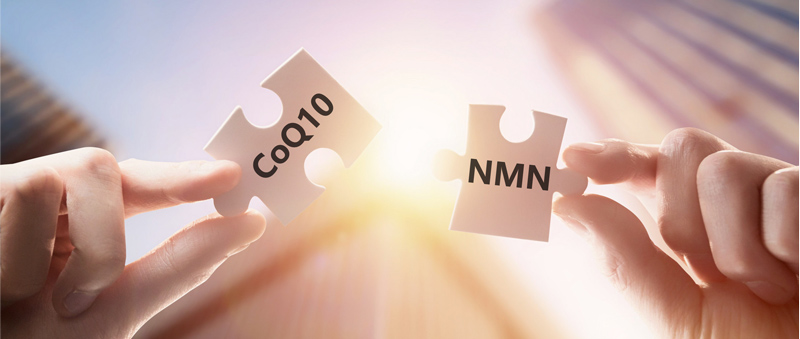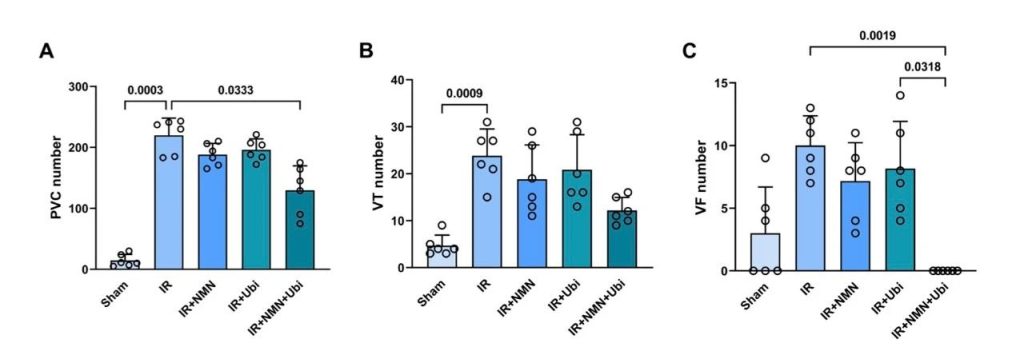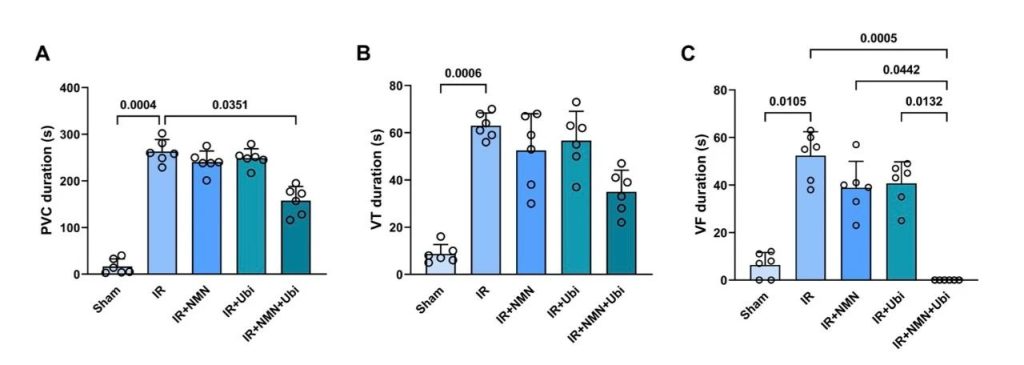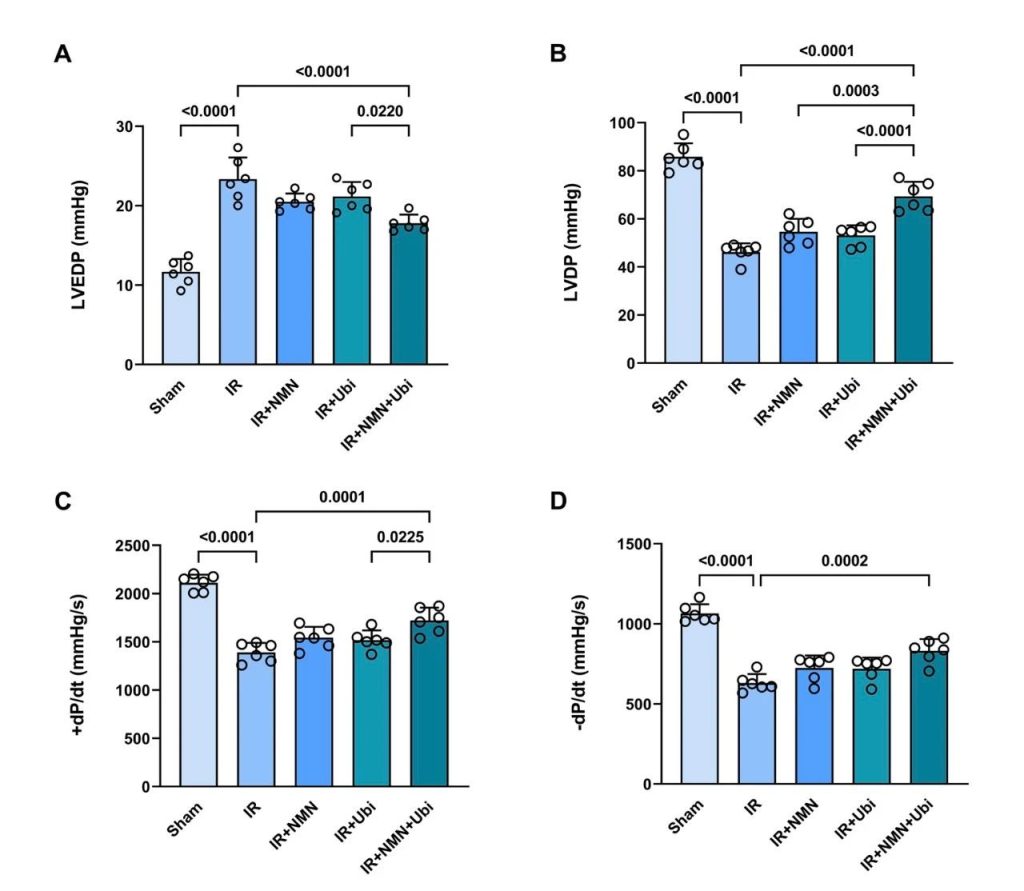Save the heart, NMN and coQ10 work better in combination
Combined application of NMN+ coenzyme Q10
NMN and CoQ10, respectively, have been shown to benefit heart health.
A 2024 study published in the Advanced Pharmaceutical Bulletin found that NMN combined with coenzyme Q10 had a better effect.
Fatal ventricular arrhythmia is an important clinical problem after ischemia/reperfusion injury in older people patients with myocardial infarction.
The combination of NMN and coenzyme Q10 has a better anti-arrhythmic effect, and its mechanism may be related to the reduction of oxidative stress and the increase of nitric oxide (NO) production.
1. What is the role of NMN and Coenzyme Q10?

Beta-nicotinamide mononucleotide (NMN)
NMN is a derivative of vitamin B3 that works by efficiently converting to NAD+.
The full name of NAD+ is nicotinamide adenine dinucleotide, referred to as coenzyme Ⅰ, NAD+ is involved in many important biochemical reactions in the body, including energy metabolism, DNA repair, gene expression regulation and so on.
It is essential for maintaining mitochondrial function and cell health, and is thought to have anti-aging properties.
Coenzyme Q10 (CoQ10)
Coenzyme Q10, a fat-soluble antioxidant, not only protects DNA from oxidative damage, but also has anti-inflammatory, anti-apoptotic and other functions, participates in cell respiration, and plays an important role in mitochondrial energy synthesis.
Coq10 is widely present in various tissues and organs, and is particularly important in the heart, kidneys, liver, muscles, etc., which have high energy requirements.
NAD+ and coenzyme Q10 are both indispensable substances in the human body, and they work together to ensure the efficient conduct of mitochondrial energy metabolism.
In a simple analogy, the mitochondria in the cell act as the “power plant,” coenzyme Q10 acts as the “generator” in the power plant, and NAD+ acts as the “fuel” in this process, together converting nutrients into the energy molecule ATP(adenosine triphosphate).
As we all know, the heart is a 24/7 “energy hog,” so NMN (through its conversion to NAD+) and Coenzyme Q10 play a key role in heart health.
2. NMN+ Coenzyme Q10 significantly alleviates arrhythmia
With age or after a heart attack, the levels of NMN and coQ10 in the heart decrease significantly, which can cause stress and damage to the mitochondria.
After myocardial infarction, the heart in a state of ischemia, and when the blood flow restored, the damage will further aggravated instead of improved, which called ischemia/reperfusion injury (IR), which will cause mitochondrial damage, myofibrillar structure destruction, arrhythmia, and other serious threats to health.
This is especially dangerous in older people who have accumulated mitochondrial damage from aging.
The researchers used older people rats to simulate the course of heart attack and divided them into 5 groups for control study: sham operation group (normal control group), ischemia/reperfusion injury group (IR group), IR+NMN group, IR+NMN+ CoQ10 group, and IR+NMN+ CoQ10 group.
The results found that both NMN and coQ10 alone reduced the number and duration of arrhythmias, but the combination of both significantly reduced the number and duration of arrhythmias.


Similar results were obtained when the heart function was further tested.
The combined use of NMN+ Coenzyme Q10 significantly restored cardiac function indicators such as cardiac contraction and blood pumping, and the effect was better than that of the single treatment group.

3. Mechanism exploration: antioxidant + increases NO
The main mechanisms of heart ischemia/reperfusion injury include:
A large number of reactive oxygen species (ROS) destroy cells and cause oxidative stress, calcium overload damages mitochondrial function, inflammatory reactions cause more tissue damage, microcirculation disorders hinder effective blood flow recovery, etc.
In previous studies, NMN has found to significantly increase the level of NAD+ in the heart of experimental animals and prevent the reduction of NAD+ during ischemia;
Protect the ultrastructure of heart mitochondria, reduce the level of reactive oxygen species, and prevent heart failure;
Alleviating cardiac fibrosis and preventing cardiomyopathy;
Reverse age-related systolic dysfunction of the heart.
A review published in 2020, which searched a large number of clinical studies from 2001 to 2019, found that coQ10 levels reduced in patients with heart failure, coronary heart disease, myocardial infarction, hypertension, diabetes, lung disease, non-alcoholic fatty liver disease, and neurodegenerative diseases, and that supplementation with CoQ10 may improve symptoms and outcomes.
This time, the researchers found that when NMN and coQ10 were combined in an older people animal model:
- The level of damage molecules in heart cells decreased significantly, showing a stronger protective effect.
- Decreased ROS levels and signs of cellular stress, while increasing antioxidant enzyme activity;
- Levels of nitric oxide (NO), which is very important for heart function, only improve when both NMN and coQ10 are given before a heart attack.
These results suggest that NMN and coQ10, when used together, can effectively reduce oxidative stress and increase nitric oxide (NO) production, thus allowing the heart to work better, reduce stress and protect cells from damage.
Aging may disrupt the function of mitochondria and other protective pathways, reducing the effectiveness of monotherapies, the researchers said.
Using both NMN and CoQ10 appears to address these issues, making it a better way to protect the older people heart from ischemia-reperfusion damage.
reference
- [1] Superior Anti-arrhythmogenic Effect of Combined Conditioning with Nicotinamide Mononucleotide and Ubiquinol in Myocardial Ischemia/Reperfusion Injury in Aged Rats. DOI: 10.34172/apb.2024.044
- [2] Nicotinamide mononucleotide, an intermediate of NAD+ synthesis, protects the heart from ischemia and reperfusion. DOI: 10.1371/journal.pone.0098972
- [3] Short-term administration of Nicotinamide Mononucleotide preserves cardiac mitochondrial homeostasis and prevents heart failure. DOI: 10.1016/j.yjmcc.2017.09.001
- [4] Nicotinamide mononucleotide attenuates isoproterenol-induced cardiac fibrosis by regulating oxidative stress and Smad3 acetylation. DOI: 10.1016/j.lfs.2021.119299
- [5] Nicotinamide Mononucleotide Alleviates Cardiomyopathy Phenotypes Caused by Short-Chain Enoyl-Coa Hydratase 1 Deficiency. DOI: 10.1016/j.jacbts.2021.12.007
- [6] SS-31 and NMN: Two paths to improve metabolism and function in aged hearts. DOI: 10.1111/acel.13213
- [7] Coenzyme Q10Supplementation for the Reduction of Oxidative Stress: Clinical Implications in the Treatment of Chronic Diseases. doi: 10.3390/ijms21217870



